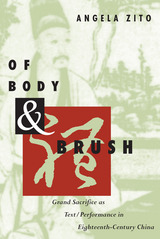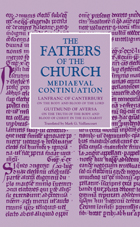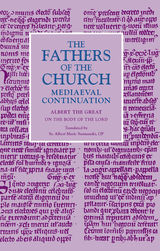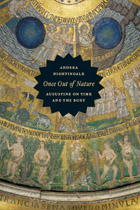114 books about Body and 4
start with O
114 books about Body and 4
114 books about Body
4 start with O start with O
4 start with O start with O

Of Body and Brush
Grand Sacrifice as Text/Performance in Eighteenth-Century China
Angela Zito
University of Chicago Press, 1997
The Qianlong emperor, who dominated the religious and political life of eighteenth-century China, was in turn dominated by elaborate ritual prescriptions. These texts determined what he wore and ate, how he moved, and above all how he performed the yearly Grand Sacrifices. In Of Body and Brush, Angela Zito offers a stunningly original analysis of the way ritualizing power was produced jointly by the throne and the official literati who dictated these prescriptions.
Forging a critical cultural historical method that challenges traditional categories of Chinese studies, Zito shows for the first time that in their performance, the ritual texts embodied, literally, the metaphysics upon which imperial power rested. By combining rule through the brush (the production of ritual texts) with rule through the body (mandated performance), the throne both exhibited its power and attempted to control resistance to it. Bridging Chinese history, anthropology, religion, and performance and cultural studies, Zito brings an important new perspective to the human sciences in general.
Forging a critical cultural historical method that challenges traditional categories of Chinese studies, Zito shows for the first time that in their performance, the ritual texts embodied, literally, the metaphysics upon which imperial power rested. By combining rule through the brush (the production of ritual texts) with rule through the body (mandated performance), the throne both exhibited its power and attempted to control resistance to it. Bridging Chinese history, anthropology, religion, and performance and cultural studies, Zito brings an important new perspective to the human sciences in general.
[more]

On the Body and Blood of the Lord; On the Truth of the Body and Blood of Christ in the Eucharist
Lanfranc of Canterbury and Guitmund of Aversa
Catholic University of America Press, 2009
In this first English translation of Lanfranc's De corpore et sanguine Domini adversus Berengarium, the reader learns firsthand both the history of the crisis and the doctrinal issues in question
[more]

On the Body of the Lord
Albert Albert the Great
Catholic University of America Press, 2017
Albert the Great wrote On the Body of the Lord in the 1270s, making it his final work of sacramental theology. A companion volume to his commentary on the Mass, On the Body of the Lord is a comprehensive discussion of Eucharistic theology. The treatise is structured around six names for the Eucharist taken from the Mass: grace, gift, food, communion, sacrifice, and sacrament. It emerges from the liturgy and is intended to draw the reader back to worship.
The overall movement of the treatise follows the order of God’s wisdom. Albert begins by discussing the Eucharist as a gift flowing from the goodness of the Trinity. He touches on its relation to redemption and the Church, including a rigorous Aristotelian analysis of Eucharistic change and presence before ending with a discussion of Mass rubrics. The most significant theological emphasis is on the Eucharist as food given to feed the people of God.
The style varies to suit the content: certain sections are terse; others are devotional, allowing the reader to enter the saint’s own prayer. Perhaps most characteristically Albertine is an extended meditation that compares the process of digestion to the incorporation of the Christian into the Body of Christ. The mixed style allows this work to integrate rigorous aspects of scholastic thought with a fervent love for God, making On the Body of the Lord one of Albert’s most human as well as one of his most beautiful works.
On the Body of the Lord was well received, particularly in areas that came to be influenced by the devotio moderna. By 1484, three separate Latin editions had been printed, two of which were the inaugural works on new presses. In the following century the Protestant Reformation brought an end to its popularity. On the Body of the Lord is here translated into English for the first time.
The overall movement of the treatise follows the order of God’s wisdom. Albert begins by discussing the Eucharist as a gift flowing from the goodness of the Trinity. He touches on its relation to redemption and the Church, including a rigorous Aristotelian analysis of Eucharistic change and presence before ending with a discussion of Mass rubrics. The most significant theological emphasis is on the Eucharist as food given to feed the people of God.
The style varies to suit the content: certain sections are terse; others are devotional, allowing the reader to enter the saint’s own prayer. Perhaps most characteristically Albertine is an extended meditation that compares the process of digestion to the incorporation of the Christian into the Body of Christ. The mixed style allows this work to integrate rigorous aspects of scholastic thought with a fervent love for God, making On the Body of the Lord one of Albert’s most human as well as one of his most beautiful works.
On the Body of the Lord was well received, particularly in areas that came to be influenced by the devotio moderna. By 1484, three separate Latin editions had been printed, two of which were the inaugural works on new presses. In the following century the Protestant Reformation brought an end to its popularity. On the Body of the Lord is here translated into English for the first time.
[more]

Once Out of Nature
Augustine on Time and the Body
Andrea Nightingale
University of Chicago Press, 2011
Once Out of Nature offers an original interpretation of Augustine’s theory of time and embodiment. Andrea Nightingale draws on philosophy, sociology, literary theory, and social history to analyze Augustine’s conception of temporality, eternity, and the human and transhuman condition.
In Nightingale’s view, the notion of embodiment illuminates a set of problems much larger than the body itself: it captures the human experience of being an embodied soul dwelling on earth. In Augustine’s writings, humans live both in and out of nature—exiled from Eden and punished by mortality, they are “resident aliens” on earth. While the human body is subject to earthly time, the human mind is governed by what Nightingale calls psychic time. For the human psyche always stretches away from the present moment—where the physical body persists—into memories and expectations. As Nightingale explains, while the body is present in the here and now, the psyche cannot experience self-presence. Thus, for Augustine, the human being dwells in two distinct time zones, in earthly time and in psychic time. The human self, then, is a moving target. Adam, Eve, and the resurrected saints, by contrast, live outside of time and nature: these transhumans dwell in an everlasting present.
Nightingale connects Augustine’s views to contemporary debates about transhumans and suggests that Augustine’s thought reflects our own ambivalent relationship with our bodies and the earth. Once Out of Nature offers a compelling invitation to ponder the boundaries of the human.
[more]
READERS
Browse our collection.
PUBLISHERS
See BiblioVault's publisher services.
STUDENT SERVICES
Files for college accessibility offices.
UChicago Accessibility Resources
home | accessibility | search | about | contact us
BiblioVault ® 2001 - 2024
The University of Chicago Press









